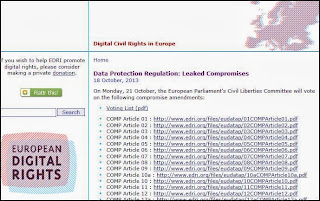I wasn’t sure what I thought of the office of the Surveillance Camera
Commissioner until I attended an SCC conference at the Royal Society earlier
this week.
With a remit that covers less than 5% of the camera population, a mandate
to encourage compliance with a Code of Practice in just England and Wales, and with
no direct enforcement powers against those who ignore the Code, the image of
Big Brother’s little brother initially sprang to mind. Those responsible for
creating this office were evidently determined to ensure that this Commissioner’s
role would be evangelical in nature, and not prescriptive.
Let’s remember that his office created by the Protection of Freedoms Act
2012 to meet the coalition agreement to further regulate CCTV. The Act committed
the Home Office (not the Commissioner) to produce a code of practice to set out
guidelines for CCTV and automatic number plate recognition. The Commissioner exists
to encourage compliance with the code, review how it is working and to provide
advice to ministers on whether or not it needs amending.
As it is, the current Commissioner will be leaving his office next year, so
he won’t have much time to advise ministers on the extent to which the Code has
been adopted. He’s not leaving because he’s disillusioned with the role, but
because his other job, that of Forensic Science Regulator, will be ending.
Would applicants for the role of the next Surveillance Camera Commissioner form
an orderly queue please, behind me.
What did become pretty apparent pretty quickly at the conference, however,
was that there is a role to be played by someone to evalgelise good data
protection standards in this area, as things can go tragically wrong, say when
Automatic Number Plate Recognition systems are not used effectively. Last February, the Association of Chief
Police Officers published a report which was triggered by the findings and
recommendations from an IPCC investigation into ANPR use surrounding the murder
of Ashleigh Hall. Two further IPCC investigations, those into the deaths of
Hayley Adamson and Sean Robert Toombs, also highlighted concerns. It’s really
worth reading,
So where do we go from
here?
Well, during a panel
session and in a roundabout way, I asked Lord Taylor, the Home Office Minister,
whether he thought it important that more evidence be adduced which could be
used to explain to citizens why it was necessary for the Surveillance Camera Commissioner
to have a role independent to that of the Information Commissioner. His answer
was quite interesting. Of course it was necessary for a Commissioner to have been
created last year because there was a very important job to do at that time. This
was what I had expected to hear – he was a minister, after all, in a Government
which had only recently introduced the Act. And, the current Commissioner,
Andrew Rennison, was an extremely capable man. But I did not sense a ringing
endorsement that the Office of the Surveillance Camera Commissioner itself was so
vitally important that it always needed to remain independent of that of the
Information Commissioner.
So I have a cunning plan.
When the current term of
the Surveillance Camera Commissioner ends, the Home Office could consider either
of two options.
The first option is to
replace Andrew Rennison with yours truly. I’ll gladly make myself available,
either on a full time or a part time basis.
The second option is to speak
nicely to the Information Commissioner’s Office and arrange for Jonathan Bamford,
the ICO’s Head of Strategic Liaison, to reduce his contracted hours at the ICO
to, say 2 ½ days a week. Then, Jonathan can be appointed Surveillance Camera Commissioner
for the remaining 2 ½ days a week. Jonathan
was also at the conference, and gave a great speech. After all, he currently
deals with many of the matters that are just outside the Andrew Rennision’s reach.
And he knows Lord Taylor.
The beauty of the “JB for
SCC” option is that when the Surveillance Camera Commissioner needs help persuading
the remaining 95% of the camera population to adhere to the Home Office’s Code,
or do stuff in Scotland or Northern Ireland, or carry out enforcement action when
it is necessary, all the Commissioner needs to do is send a memo to himself. And,
when JB returns to his ICO duties later in the week, he can deal with it.
Easy.
Sources:








